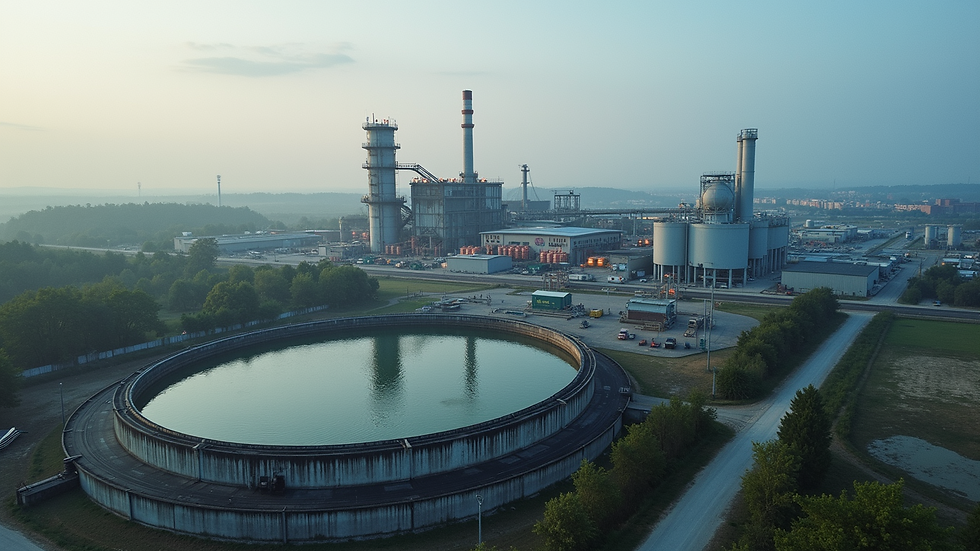Innovative Solutions for Industrial Wastewater Management
- palwinder kaur
- Aug 28, 2025
- 4 min read
Industrial wastewater is a significant environmental challenge faced by many industries worldwide. The discharge of untreated or poorly treated wastewater can lead to severe pollution, affecting ecosystems and human health. To address this, industries are increasingly adopting innovative wastewater solutions that are efficient, sustainable, and cost-effective. These solutions not only help in meeting regulatory standards but also contribute to resource recovery and environmental conservation.
Exploring Innovative Wastewater Solutions
Innovative wastewater solutions involve the use of advanced technologies and methods to treat industrial effluents effectively. These solutions focus on reducing contaminants, recovering valuable materials, and minimizing the environmental footprint of industrial processes. Some of the most promising innovations include:
Membrane Filtration Technologies: Techniques such as ultrafiltration, nanofiltration, and reverse osmosis are widely used to remove suspended solids, dissolved salts, and organic compounds from wastewater. These membranes provide high-quality effluent suitable for reuse in industrial processes.
Biological Treatment Enhancements: Advanced biological treatments like membrane bioreactors (MBRs) combine conventional activated sludge processes with membrane filtration, offering superior treatment efficiency and smaller footprint.
Electrochemical Treatment: This method uses electric current to remove pollutants through oxidation and reduction reactions. It is particularly effective for treating heavy metals and refractory organic compounds.
Zero Liquid Discharge (ZLD) Systems: ZLD aims to eliminate liquid waste by recovering and recycling all water from the wastewater stream. This approach is gaining traction in water-scarce regions and industries with stringent discharge regulations.
Smart Monitoring and Automation: Integration of IoT sensors and AI-driven analytics enables real-time monitoring and optimization of wastewater treatment processes, improving efficiency and reducing operational costs.
These innovative wastewater solutions are transforming how industries manage their effluents, making treatment processes more sustainable and aligned with environmental goals.

Benefits of Implementing Innovative Wastewater Solutions
Adopting innovative wastewater solutions offers multiple benefits to industries, communities, and the environment. Some key advantages include:
Improved Water Quality: Advanced treatment technologies ensure the removal of harmful contaminants, resulting in cleaner water that can be safely discharged or reused.
Resource Recovery: Many innovative systems enable the recovery of valuable resources such as metals, nutrients, and clean water, turning waste into economic opportunities.
Regulatory Compliance: Meeting stringent environmental regulations becomes easier with reliable and efficient treatment methods, reducing the risk of fines and legal issues.
Cost Savings: Although initial investments may be high, long-term operational savings are achieved through reduced water consumption, lower sludge production, and energy-efficient processes.
Environmental Protection: Minimizing pollutant discharge helps protect aquatic life, soil quality, and public health, contributing to sustainable industrial development.
Industries that invest in these solutions demonstrate corporate responsibility and enhance their reputation among stakeholders.
What are the three types of industrial wastewater treatment?
Industrial wastewater treatment typically involves three main types of processes, each targeting specific contaminants and treatment goals:
Primary Treatment
This is the initial stage where physical processes like screening, sedimentation, and flotation remove large solids, grit, and floating materials from the wastewater. Primary treatment reduces the load on subsequent treatment stages.
Secondary Treatment
This stage focuses on biological processes to degrade organic matter and reduce biochemical oxygen demand (BOD). Common methods include activated sludge systems, trickling filters, and biofilm reactors. Secondary treatment significantly improves water quality by breaking down pollutants biologically.
Tertiary Treatment
The final stage involves advanced treatment techniques to remove remaining contaminants such as nutrients (nitrogen and phosphorus), heavy metals, and pathogens. Methods include chemical precipitation, filtration, disinfection, and membrane technologies. Tertiary treatment produces high-quality effluent suitable for reuse or safe discharge.
Understanding these treatment types helps industries design effective wastewater management systems tailored to their specific effluent characteristics.

Practical Recommendations for Effective Wastewater Management
Implementing innovative wastewater solutions requires careful planning and execution. Here are some actionable recommendations for industries aiming to improve their wastewater management:
Conduct Comprehensive Wastewater Characterization
Analyze the composition, volume, and variability of wastewater to select appropriate treatment technologies.
Invest in Modular and Scalable Systems
Choose treatment units that can be expanded or modified as production scales or regulations change.
Integrate Resource Recovery Options
Explore opportunities to recover water, energy, and materials from wastewater streams to enhance sustainability and profitability.
Implement Real-Time Monitoring
Use sensors and automation to track treatment performance and detect issues early, ensuring consistent compliance.
Train Personnel and Foster Awareness
Equip staff with knowledge and skills to operate and maintain treatment systems effectively.
Collaborate with Experts and Technology Providers
Partner with specialized companies to access cutting-edge solutions and technical support.
By following these guidelines, industries can optimize their wastewater treatment processes and contribute to environmental stewardship.
Future Trends in Industrial Wastewater Treatment
The future of industrial wastewater treatment is shaped by technological advancements and growing environmental concerns. Emerging trends include:
Artificial Intelligence and Machine Learning
AI-driven models will enhance process control, predictive maintenance, and decision-making in wastewater treatment plants.
Green and Sustainable Technologies
Development of eco-friendly treatment methods using natural materials, bioelectrochemical systems, and renewable energy sources.
Circular Economy Approaches
Emphasis on waste minimization, water reuse, and resource recovery to create closed-loop industrial systems.
Decentralized Treatment Solutions
Small-scale, on-site treatment units will become popular for remote or distributed industrial facilities.
Enhanced Regulatory Frameworks
Stricter environmental policies will drive innovation and adoption of advanced treatment technologies.
Staying informed about these trends will help industries remain competitive and compliant in the evolving environmental landscape.

Adopting innovative wastewater solutions is essential for industries aiming to reduce their environmental impact and improve operational efficiency. By leveraging advanced technologies and best practices, businesses can achieve sustainable industrial wastewater management that benefits both the environment and their bottom line. For more information on effective industrial wastewater management, explore specialized resources and expert guidance to tailor solutions to your specific needs.



Comments